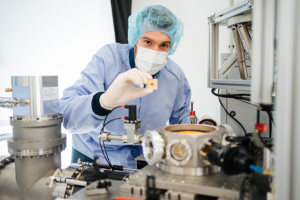Infineon Technologies and eleQtron GmbH, a quantum computing (QC) pioneer from Siegen, North Rhine-Westphalia, Germany, announced a partnership to jointly develop trapped-ion quantum processor units (QPUs) for scalable quantum computers.
 This second Infineon partnership with a key player in the ion trap field is the first commercial activity in the German quality control ecosystem. This underscores Infineon's preeminent position in offering industry-leading ion trap QPUs that are manufactured in a predictable, repeatable and reliable manner.
This second Infineon partnership with a key player in the ion trap field is the first commercial activity in the German quality control ecosystem. This underscores Infineon's preeminent position in offering industry-leading ion trap QPUs that are manufactured in a predictable, repeatable and reliable manner.
“As a leading company in the development of quantum computing hardware, Infineon’s goal is to provide the core components and, together with our partners, enable the first significant quantum computing systems based on trapped ion technology,” said Richard Kuncic, vice-president. senior president and general manager, Power Systems at Infineon. “We contribute unique technology and world-class manufacturing capabilities to achieve quantum utility.”
“Our partnership with Infineon represents a significant milestone in our strong mission to develop and competitively deliver highly scalable, computationally powerful quantum computing systems available to the huge enterprise applications market,” added Jan Leisse, CEO from eleQtron. “We are confident that our pioneering technology based on ion traps and radio frequency waves, combined with Infineon's capability and experience in innovative QPU production, will provide the basis for building quantum computing systems ready for the first applications by mid 2027.”
eleQtron aims to offer internationally competitive quantum processing units (QPUs) with high computing power using the promising MAGIC technology.
The “gradient-induced magnetic coupling” or MAGIC concept allows control of qubits using radio frequency technology instead of lasers achieving record low crosstalk between adjacent qubits. This unique approach simplifies the necessary scaling of TIQC hardware to higher Qubit numbers and complements other scaling strategies. The partners will also investigate a new microstructured three-dimensional ionic memory, paving the way for a modular and versatile QPU architecture.
During the development phase, Infineon will provide eleQtron with three progressively improved generations of ion traps, as well as the necessary expertise to adapt them to the MAGIC concept.
By employing a co-design strategy, Infineon will enable eleQtron to build ion trap-based quantum computers with ever-increasing functionality. Later, these powerful quantum computers will also be made available to industrial and scientific users through cloud access.
“Being chosen by eleQtron as a QPU supplier will allow us to accelerate our quantum computing hardware roadmap and expand our business in this emerging segment,” said Kuncic.

